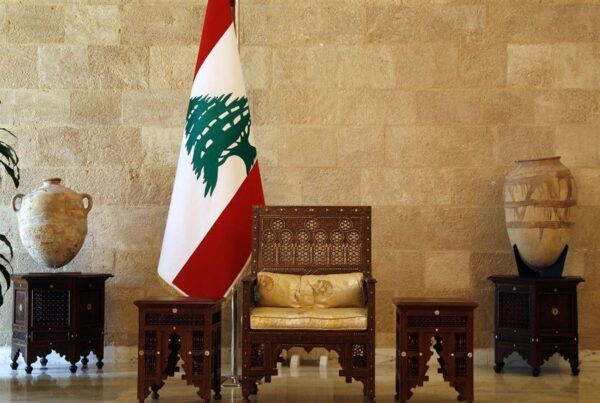Baabda presidential chair awaits the new occupant of the palace after president Michel Aoun’s term ended on October 31 , 2022 . The Lebanese parliament failed for the 12th time to elect a president last Wednesday because of the current flawed presidential election system . The system needs to be reformed
BEIRUT — Lebanon’s parliament will convene Jan. 9 for the election of a president, state media reported Thursday, following more than two years of presidential vacuum.
Parliament Speaker Nabih Berri made the announcement during a session of parliament Thursday, l National News Agency (NNA ) reported
Commenting on the presidential session, Berri said, “It will be fruitful, and we have given a one-month period to reach consensus among us.”
He noted that he will invite foreign ambassadors to attend the upcoming session.
But his statement: ” We have given a one-month period to reach consensus among us” was understood by observers as another one of Berri’s tricks in trying to manipulate the election
Obstruction
Ever since President Michel Aoun’s term ended on 31 October 2022, the Lebanese parliament has not been able to elect a president to replace Aoun, primarily because Berri has been using his position as the speaker to block the election
Berri derives all his political strength from the heavily armed Hezbollah militant group.
The Iranian-backed Hezbollah imposed the election of Aoun on the Lebanese parliament in 2016 and has been trying to duplicate the scenario with its candidate Suleiman Franjieh but so far has failed because it no longer commands a majority in the parliament
Berri has been dreaming up plans to help Hezbollah impose its candidate by blocking any election sessions and reverting to his old tricks of manipulation and corruption
“In the heavily corrupted Lebanon Berri is known to be the father of corruption,” Ali Hussein a Lebanese political analyst told Ya Libnan
He insists that the only road to a presidential election is dialogue.
The announcement of a new parliament session to vote for a president comes one day after a ceasefire approved by Israel and the Lebanese government entered into effect, ending more than a year of hostilities between the armed Hezbollah group and the Israeli army.
However, the security situation remains volatile. On Thursday, the Israeli army said the ceasefire was breached after several suspect vehicles and individuals approached areas in southern Lebanon near the border with Israel, forcing its troops to fire at them.
Flawed election system
Lebanon’s presidential election system has come under scrutiny in recent years due to its inherent flaws and the potential for undemocratic outcomes.
The current system, which requires a candidate to secure a two-thirds majority in the first round, often leads to situations where even a candidate with the support of 65 % of the parliament in the first round may fail to secure victory. It is imperative to reconsider this system and explore alternative approaches to ensure a fair and representative electoral process, according to analysts
In the most recent election the candidate of the opposition, former minister Jihad Azour secured 59 votes of the 128-member parliament in the first round while his opponent ” Franjieh” Hezbollah candidate secured 51 votes. At the end of the first round, the MPs of Hezbollah and its allies and their candidate walked out of the parliament and declared victory. The speaker who is a very close ally of Hezbollah decided to end the election session. This scenario could have repeated itself if Franjieh had been in the lead. The Lebanese election system is therefore to blame for the impasse.
According to analysts the current presidential election system in Lebanon is in dire need of reform. The existing two-thirds majority requirement in the first round, coupled with the potential quorum issues in the second round, has resulted in undemocratic outcomes and a lack of faith in the process. By adopting the “half plus one” system in the first round, Lebanon can move towards a more representative and inclusive electoral process, ensuring that the will of the majority prevails. It is crucial for the Lebanese lawmakers to address these concerns and work towards a fairer presidential election system that upholds the principles of democracy and strengthens public trust in their democratic institutions.
Amending Article 49 of the constitution is the key to fair elections
Instead of wasting time on fake dialogue and arms-twisting Speaker Berri should immediately call for a session to amend Lebanon’s current flawed presidential election system as per Article 49 of the constitution
“I hope you followed how democratic voting at the National Assembly happened in an open session with successive rounds,” Geagea told Berri, blaming Berri for obstructing the election sessions
French Envoy Urges Election
France’s special envoy on Friday said Lebanon needed to elect a president
Jean-Yves Le Drian’s visit to Lebanon follows a fragile ceasefire to end the war between Israel and Hezbollah.
“I came to Lebanon immediately after the ceasefire announcement to signal France’s support for its full implementation and to stress the urgent need, more than ever, to elect a president and restart the institutional process,” he told AFP on Friday.
He said he was in support of Thursday’s announcement by Parliament Speaker Nabih Berri of a presidential election to be held on 9 January.
Lebanese Prime Minister Najib Mikati said on Wednesday he hoped the ceasefire agreement would mark “a new page for Lebanon”, calling for a swift presidential election.

